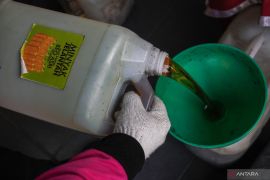Currently, oil from the nyamplung tree, also known as tamanu, is mostly used in cosmetics and drugs, he noted. Nyamplung oil has even been exported to some countries, he pointed out.
Although the oil for cosmetics and medicinal ingredients is priced up to Rp350 thousand per liter, the market for cosmetics containing tamanu is still very small, he said.
"The cosmetics market is at the top of the nyamplung market triangle, so the number (demand) is limited," Leksono said at a webinar entitled 'Not Only Palm Oil, Indonesia is Rich in Various Biofuels' here on Wednesday.
The position of nyamplung market for biofuel or BBN is below the triangle, he informed.
To turn nyamplung into biofuel, the government must build a strategy for developing the oil so that its price is cheaper than petroleum fuel, Leksono said. This will ensure biofuels are not only obtained from palm oil, he added.
Related news: Environment Ministry researcher preparing biofuel from tamanu oil
According to him, in 12 regions in Indonesia, oil produced from trees has an acid value of about 50 mgKOH per gram, while oil for biofuels should have acid levels below 0.6 mgKOH per gram.
"We have to lower the acid value from about 50 to 0.6. The process is quite long," he pointed out.
After they are dried, nyamplung seeds still have to be manually pressed, followed by degumming, esterification, transesterification, washing, and drying to make biodiesel, he explained.
Meanwhile, if processed mechanically, after the seeds are dried, the process of compressing nyamplung oil and turning it into biodiesel can be done by machine, he said.
According to Leksono, the development of nyamplung oil as a raw material for biofuel needs to be done from now itself. This is to ensure Indonesia does not lag behind other countries in diversifying new and renewable energy (EBT) materials, he said.
"We see Brazil and the United States are already exporting bioethanol. We have plants for bioethanol whose productivity may be greater than that of Europe and the US; this is what we have to develop slowly and ensure in the future," he expounded.
Related news: Involve forestry sector to achieve net-zero emissions: researcher
Related news: Government should design framework for biofuel to lower emissions: NGO
Translator: Sanya S, Kenzu T
Editor: Suharto
Copyright © ANTARA 2021












